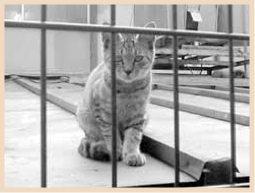
Todd Jay Leonard, Blog


When I was first learning Japanese, I noticed a similarity between English and Japanese in that there are a lot of phrases that refer to “cats.” The first such phrase I remember learning in Japanese literally translates to “cat’s tongue.”
It is used when someone takes a bite of hot food and says “nekojita,” meaning “the food is too hot for my tongue.” Of course, a similar phrase in English that people often use is “does the cat have your tongue?” These two sayings have completely different meanings, but the reference each one makes to “cats” and “tongues” is what interested me.
The term “cat burglar” refers to the stealthy movement a robber makes in the shadows, skulking about, similar to that of a cat. The Japanese phrase, “nekobaba,” is the slang term used for crooked politicians or government officials who pocket public funds.
It can also be used like the English phrase “finders keepers, losers weepers;” meaning that something found on a road or somewhere is a form of nekobaba. I found each Japanese person I would ask about this phrase would have a different idea about its meaning.
I have personally heard it used with someone who has a tendency to pilfer little things from a public place — like a salt shaker from a table in a restaurant. Interestingly, though, both phrases disparage cats by relating them to an act of “thieving.”
“Nekome” is a phrase I occasionally heard early on in my tenure in Japan, but I had a hard time figuring out the exact meaning of this _expression. Literally it means “cat’s eye,” but in practice conveys “good eyesight,” so I immediately thought of the old-style “cat-eye” glasses that were so popular in the 1950s. This had nothing to do with the true meaning of the phrase, however.
Nekome is, in fact, very closely related to a common English phrase that means the same thing. It refers to the way cats’ eyes shine in the light at night — e.g., He was so shocked at the news that he stood there “like a cat in headlights.”
The Japanese phrase “nekoze” doesn’t really have a good English equivalent, but is easily visualized and understood when the connection is made: This phrase refers to a cat’s arched back, and is used in reference to people who are slump-shouldered or who are slightly hunch-backed.
A number of Japanese cat-related phrases make logical sense when explained clearly. For instance, the term “neko nade goe” means “cat’s voice” but more accurately means to lure someone to you with a coaxing voice, like a kitten meowing to get some milk.
“Neko ka buri” is “camouflage” but would probably be translated into English as “a wolf in sheep’s clothing.” The English phrases “everybody and his brother” or “every Tom, Dick and Harry” are similar to the Japanese saying “neko mo shakushi mo.” It literally means “even cats and ladles,” meaning “everybody.”
Geisha were once referred to as “neko” because the stringed instrument they were trained to play — the shamisen — was traditionally made from cat skin. I imagine the name also has something to do with the mystery surrounding geisha, and their enigmatic behavior that could be defined as “cat-like.”
Cats originally came to Japan via Korea and China in ancient times. Until around the 10th century, they were quite rare and esteemed. In the 12th century, it appears that cats became more commonplace and everyday people began to have them as pets.
Initially, long-tailed cats were preferred, but during the Edo period (1600-1868), stubby-tailed cats gained in popularity. I sometimes see these short-tailed cats, and they look so unnatural with their stubby little tails. After all, cats often express themselves with their tails; their graceful movements as they move their perfectly erect tails resemble the tall plants with the fuzzy spikes we call “cattails.”
The Japanese word for “pussy willow” is “neko ya nagi” which clearly contains the “cat” reference. In English, we take a “cat nap,” a person who is fearful of even simple things is a “scaredy cat,” and a brawl between two women is often called a “cat fight.” In both languages, there are a number of cat references — some similar in meaning, others not.
Although I wouldn’t consider myself a “cat” person, I do like cats and find them intriguing. Several years ago when I entered my backyard, I was startled by a huge “tomcat” sunning himself on my deck.
He looked at me, I looked at him. There was a seemingly mutual understanding between us as we sized each other up. I guess he intuitively knew that he was welcome to use my deck whenever he wanted.
With a flick of his big tail, the deal was sealed as he lazily shut his eyes and continued his nap, enjoying the comfort and security of my porch every afternoon for the remainder of the summer.
By TODD JAY LEONARD
Columnist
Phrases about cats are similar in Japan, U.S.
Monday, July 3, 2006







